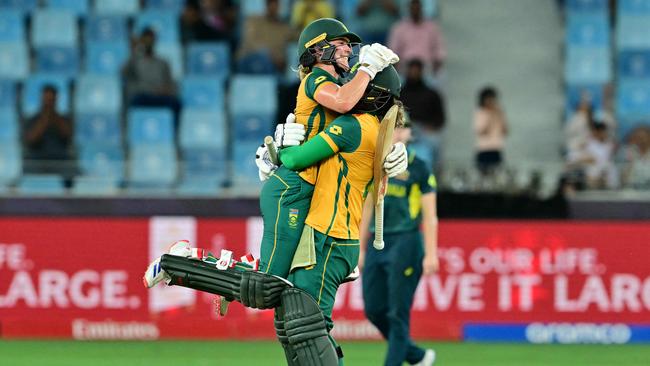
But on this occasion, Alyssa Healy had lost her smile. Australia’s stranglehold on the World Cup was slipping rapidly. There didn’t seem to be a way out. And worst of the lot, there was little the captain could do from where she sat. For a change, she couldn’t take matters into her own hands. Not from the pavilion. Not with her foot all taped up.
It was while South Africa, led by the unsung Anneke Bosch, inched closer to their target and a first-ever World Cup win over Australia that the cameras began realising how much the three-time defending champions were missing their inspirational skipper. From that point on, Healy’s absence was reiterated visually after nearly every run that the Proteas women scored. And there sat poor Alyssa, her expression growing glummer with every boundary and every over.
You could imagine all of Australia reaching out to her through the lens to see if she could somehow hobble on to the field and provide that characteristic spark. Her team had definitely missed that earlier in the evening with the bat as they stuttered to 2-35 at the end of the powerplay. It wasn’t too hard to imagine Healy being equally restless to make it to the middle, if nothing to put her arm around Tahlia McGrath, the interim captain who never looked confident enough to pull things back once Bosch began taking her attack apart.
Though there was no camera on her, you couldn’t help but wonder what Meg Lanning was going through in that moment as she watched on from back home in Australia. And how helpless the multiple World Cup-winning captain must have felt not being there.
The end to one of sport’s most dominant streaks came in rather anticlimactic fashion – by eight wickets and with nearly three overs to spare – with Aussie shoulders having slumped a while before then. It was a sign of just how dominant a show the South Africans had put on to ensure that we’ll have the first Women’s T20 World Cup final without Australia in it since 2009.
Not to forget that the knockout blow had not come courtesy of the highly-rated Laura Woolvaardt or even the superstar veteran Marizanne Kapp. This was a relatively unknown right-hander having the best night of her cricketing life.
Bosch, who idolises Serena Williams and till a handful of years ago was balancing her full-time 7am to 6pm job as a biokineticist, had single-handedly done to this Australian team what this Australian team had done to all-comers for nearly a decade and a half.
It was a surreal moment. On one hand you couldn’t help but feel for Healy in the stands as her eyes started to redden and possibly well up as the camera panned away. And also not get swept away by the sheer joy in the South African camp and what it also meant for the greater good of the women's’ game. To see Woolvaardt punching the air in the dug-out or seasoned senior Chloe Tryon breaking into a jig as she walked back with Bosch.
South Africa had become the first team since England (and of course Australia) to reach back-to-back Women’s T20 World Cup finals. I had written about the rest of the pack potentially catching up with the indomitable Australians before this World Cup began. And what South Africa produced was the best illustration of that.
It was an overall feel-good day to be a neutral cricket fan who favours the lesser-fancied. Whether it was watching the Indian men collapse to 46 all out on home soil to a New Zealand Test team that hasn’t won a Test in India since 1988 – an effort that included the most likeable of this likeable Kiwi team in Matt Henry finish with a five-wicket haul. Or seeing Pakistan bounce back after the humiliation last week to finish day three as favourites to win the second Test against England.
Just like Woolvaardt and her team had done to get payback from the Aussies for the convincing World Cup final defeat they’d handed them in front of thousands of partisan home fans in Cape Town last year. The South African captain had referred to Australia as her team’s biggest hurdle before the semi-final on Thursday night. As Mel Jones put it brilliantly, the Proteas had if anything “pole-vaulted” past their biggest hurdle in Dubai.
In a strange way, Australia fell victim to their greatest strength. Having too many good options to choose from to bat and bowl within their playing XI, even after having lost two crucial players to injury, including their captain. Power-hitters Ash Gardner and Annabel Sutherland didn’t get a hit. The legendary Ellyse Perry never got a bowl, even if it was her cameo with the bat that gave the Aussies a semblance of a reasonable total. And for once, all their plans fell flat.
Over the years we’ve seen this Australian team run roughshod over their opponents in the league stage before finding an even more destructive gear in the knockouts. But strangely, they looked off-colour against the South Africans for large parts of their batting effort and quite listless at times with the ball as Bosch pulled, walloped and reverse-swept them into submission.
For all the world-class skills within their camp and for the endless depth of talent that they thrive on, it was obvious that Australia didn’t look the same team without Healy and Lanning to lift them up when it mattered most. There was to be no famous fightback. All they could do was watch on like Healy from the pavilion as women’s T20 cricket took a giant leap towards a potentially more competitive future at their expense.
With the next edition of the Women’s T20 World Cup slated for 2026 in England, by which time Alyssa Healy will be 36, you do wonder if she’ll get to add to her glittering legacy alongside that of her era-defining team. It’s safe to say, though, that she’ll get her smile back soon – if she hasn’t done so already.






Alyssa Healy rarely loses her smile. She’s just one of those people. The cup-half-full kind. A staunch believer in “there’s always a way out”. And a leader who takes matters into her own hands, especially when the chips are down.